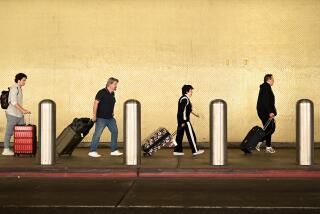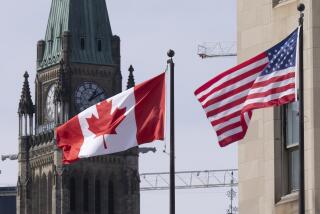Official ‘Caution’ Alert Doesn’t Deter Travelers
- Share via
Despite warnings about the dangers of travel abroad and a “heightened awareness” of terrorism at home, most Americans went about their lives Friday with only the slightest of such worries.
The State Department issued a “worldwide caution” on Thursday in the wake of the U.S. military strikes at suspected terrorist targets in Sudan and Afghanistan. The bulletin urged Americans overseas to “review their security practices . . . remain alert . . . [and] exercise much greater caution than usual.”
The advisory, coming in the final weeks of the summer vacation season, didn’t seem to cause much consternation among travelers at Los Angeles International Airport.
“We’re going to South America, which is the opposite direction,” said Carolyn Peterson, a Seattle native headed to Peru. “We just have to worry about the Shining Path,” she quipped, referring to the Marxist guerrilla group there.
Los Angeles travel agent Morris Aushenter said he has clients sign a waiver when their destination is one of the world’s trouble spots.
“We have to tell them upfront that there are places that are dangerous--just like Los Angeles,” said Bonnie Jacobs of Uniworld Travel Agency. “I’m not going to send people to Sudan, for example.”
Like their colleagues in cities across America, the officers of the LAPD’s Anti-Terrorist Division were “monitoring international developments,” a department spokesman said.
Security has been tight at LAX since the Aug. 7 bombings of two American embassies in East Africa. On Sunday, hundreds of people were cleared out of Terminal 1 when security personnel spotted what appeared to be a gun as they checked baggage through an X-ray scanner. The object in question turned out to be a gun-shaped cigarette lighter.
Although airport officials urged travelers to arrive at the airport early because additional security measures could cause delays, most travelers passed through checkpoints with little difficulty.
“I thought there might be more security at the airport. I guess in other parts of the world, like Israel, there is,” said Marj Aumann, an Australian about to board a flight to Melbourne.
In Chicago, police were already on heightened alert for a weekend air show that was expected to draw thousands of spectators to the city’s lakefront.
“We have 13,500 officers. We are everywhere and watching,” Officer Arlene Mays said.
On Friday, the Navy jets of the Blue Angels, an aerobatics team, circled Chicago in preparation for the air show.
“There is a danger out there. I hope it doesn’t come here,” said Bill Spitzer, who chomped on a cigar as the jets passed. “We have security, a lot of it. But you can’t stay indoors all the time. The news just makes us hyper-vigilant.”
Bev Finnigan, a librarian from Sidney, Iowa, who was visiting Chicago for a wedding, said she felt safe.
“I have not changed my plans,” she said. “I don’t see any real reason to be concerned.”
Security has been tightened at government buildings throughout the United States since the 1995 bombing of the federal building in Oklahoma City.
Mary Filippini of the San Francisco branch of the General Services Administration, which oversees federal properties, said additional security measures have been in place “for years.”
In New York, police restricted access to the plaza in front of City Hall. Visitors without official credentials not only had to pass through metal detectors but were grilled by officers.
Police were ordered to be particularly vigilant in patrolling in front of United Nations missions. Extra officers were also sent to landmarks where tourists gather.
Mayor Rudolph W. Giuliani and Police Commissioner Howard Safir stressed, however, that the measures were precautionary and that no specific threats in New York City had been received.
Times staff writers John J. Goldman in New York and Eric Malnic in Los Angeles and researcher John Beckham in Chicago contributed to this report.
(BEGIN TEXT OF INFOBOX / INFOGRAPHIC)
Travel Concerns
The State Department has issued a “Worldwide Caution” urging “U.S. citizens traveling or residing abroad to review their security practices, to remain alert to the changing situation, and to exercise much greater caution than usual.” Other tips:
* Avoid “large crowds and other situations in which anti-American sentiments may be expressed.”
* Schedule nonstop flights when possible and avoid stops in high-risk airports or areas. On arrival, leave the airport as soon as possible.
* Never leave your luggage unattended. Report suspicious-looking abandoned packages to authorities.
* Keep a low profile. Avoid luggage tags, dress and behavior that may identify you as an American.
* When you rent a car, don’t go for the exotic; choose a type commonly available locally. Ask that markings that identify it as a rental car be removed.
* Drive with car windows closed in crowded streets; bombs can be thrown through open windows.
* Avoid places where Americans or Westerners are known to congregate.
* Keep a mental note of safe areas, such as police stations, hotels and hospitals.
* Learn a few phrases in the local language so that you can signal for help. Make a note of emergency phone numbers, such as police, your hotel and the nearest U.S. embassy or consulate.
* Register with the embassy or consulate if you are in a high-risk area.
* Leave no personal or business papers in your hotel room.
****
“Each individual traveler must decide what level of risk he or she is comfortable with.”
--State Department spokeswoman Maria Rudensky
****
“Unless you’re willing to barricade yourself in a cave, you’re not immune to risk.”
--Steve Loucks, spokesman for the American Society of Travel Agents
****
For more information:
Call your travel agent or the State Department’s recorded information line, (202) 647-5225; its Bureau of Consular Affairs automated fax system, (202) 647-3000; or consult the department’s Internet site at https://travel.state.gov.
Source: State Department
compiled by JANE ENGLE / Los Angeles Times
More to Read
Sign up for The Wild
We’ll help you find the best places to hike, bike and run, as well as the perfect silent spots for meditation and yoga.
You may occasionally receive promotional content from the Los Angeles Times.








